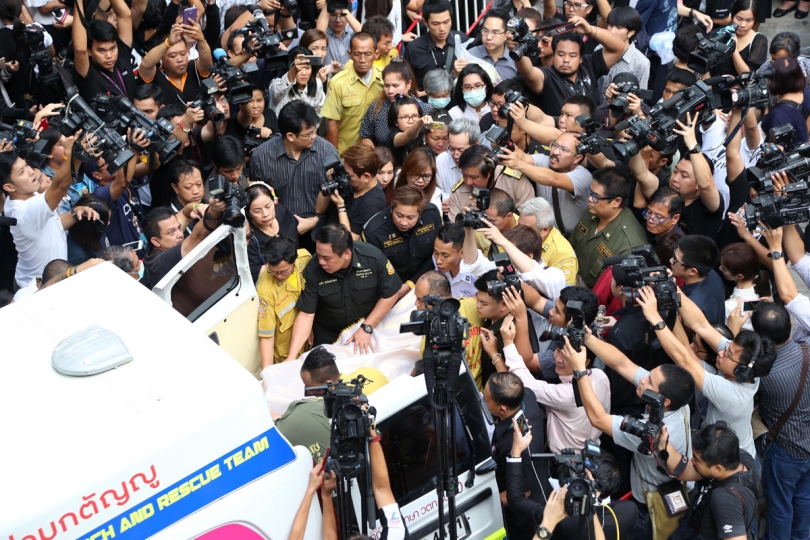Por’s death gives press the straw to break the camel’s back

The much-maligned press demonstrated again last week why it’s much maligned, photographers and reporters brawling to get a glimpse of the body of Tridsadee “Por” Sahawong as it was taken from Ramathibodi Hospital ready for transfer to Buri Ram, his hometo
The popular actor died last Monday after a two-month battle against various health complications stemming from dengue fever.
A picture of the body, even draped, is surely not what his fans want to see – not his true fans, anyway.
Utterly ignored by the swarming media horde was anything remotely close to the “Ethics Guidelines for Covering Funerals” drawn up Al Tompkins, a well-respected journalism teacher at the Poynter Institute in the US.
In the guidelines, Tompkins calls for “the highest degree of sensitivity and professionalism” among reporters attending such grim events. “Although stories about funerals can be deeply moving, newsworthy and even healing for an audience, there is great potential for journalists to intrude on a family’s privacy and cause pain to already vulnerable people.”
The Bangkok reporters “on the ground”, as they say in the business, have countered that it’s their “duty” to get the photos of Por’s corpse and his grieving family. Well, that just poured oil on the angry flames crackling in cyberspace. Folks at Pantip.com, Facebook and elsewhere were furious at such a cock-eyed interpretation of “duty” and the total lack of any sense of dignity.
“Why don’t media understand this?” one fan at Pantip fumed. “It’s not photos of Khun Por’s body or the family’s loss we want to remember. We want to remember him when he was well and happy. He gave us happiness and love. Why don’t you respect Khun Por and his family?”
“If the media want to go that far in their coverage,” another said, “I’ll join those who choose not to view the news. If you cover the funeral like you’re doing now – reporting every situation, every process with no sign of respect for the deceased and the bereaved – I choose not to view your news.”
Nation Multimedia Group editor-in-chief Thepchai Yong, who’s also president of the Thai Broadcast Journalists Association, expressed his concern on Facebook. “In the past the media could ignore criticism from the public, but the media landscape has changed. The media can be investigated as never before and people are no longer inarticulate.
“I wouldn’t be surprised if one day society loses patience and does more than criticise. The public response will be systematic and determined, because these days communication is no longer tied to just the news media. I would like all media managers to learn a lesson from Por Trisadee’s case, because this might be the starting point for restoring the public’s faith in the media.”
Thepchai’s prediction seems quite plausible. Even as we speak there’s a petition posted at Change.org urging media associations to improve their ethics and social etiquette. As of late Thursday it had more than 25,813 signatures.
RELATED





